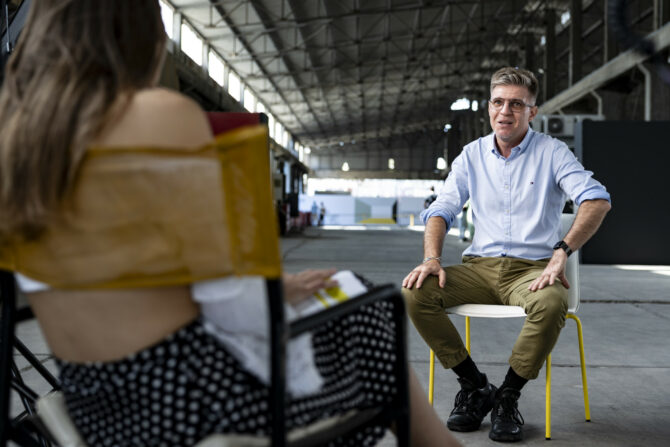Award-winning journalist and author Paul Caruana Galizia, son of the late Daphne Caruana Galizia –who was killed in a car bombing in 2017– shares insights into the perilous climate for investigative journalists in Malta and the escalating legal liabilities of reporting in the United Kingdom. Speaking with us, during the 2024 iMEdD International Journalism Forum in Athens, Galizia highlighted that exposing abuses of power and serving the public interest remain the core mission of investigative journalists who strive to stand firmly on the side of the public.
“We’ve only just started”: a discussion with investigative reporter Paul Radu

In the midst of the 2024 International Journalism Forum, iMEdD interviews Paul Radu, Co-Founder and Co-Executive Director of the Organized Crime and Corruption Reporting Project (ΟCCRP), on exposing cross-border organized crime with big data, money laundering and the need to share investigative tools with the public, while still upholding the core values of journalism.
Gentleness and an innate, natural politeness are the first impressions one gets upon meeting Paul Caruana Galizia in person. He pursued journalism professionally after the death of his mother, Daphne Caruana Galizia –also a journalist– who was killed in a car bombing in Malta in 2017. Today, Paul is an award-winning reporter and the author of the book “A Death in Malta: An Assassination and a Family’s Quest for Justice”, which won the 2023 Cornelius Ryan Award. As the chair of the jury for the 2024 IJ4EU Impact Award, which honors cross-border investigative journalism, he was in Athens for this year’s award ceremony, held on September 26, 2024, as part of the annual “UNCOVERED” conference and the iMEdD International Journalism Forum.
We met him on the sidelines of the Forum, just a few days after the presiding judge of the ongoing court case in Malta issued a general ban on public discussions or broadcasts related to his mother’s case. Before her death, Paul had worked as a researcher in universities and as an economist. “Then, in 2018, I decided I wanted to do something different. I felt quite strange going back into that work that I used to do after her death”, he explains before reflecting on how his mother’s death influenced his path into journalism: “Τhe work my mother did, especially in the last four years of her life, was really all about corruption in the public sector –corruption stemming from the prime minister’s office in Malta and reaching into really all parts of the state. She uncovered corruption schemes surrounding big privatization projects, for example. When I came to work as a journalist in London, it was a very interesting period, because it was around the time, at least a few months in, that Boris Johnson became the prime minister of the United Kingdom. And, so, people began thinking and talking about corruption in government there, which was very new to them. They had never confronted it or been made to confront it in that way. So, there was a lot of discussion about appointments the prime minister was making to the House of Lords, across government, contracts he was awarding, and to whom, and in what way. That became of really great interest to me, because I began seeing some parallels between Malta and the UK. I don’t mean to say there’s a similarity of degree –there really isn’t. But you could see the same forces at work: you know, a very powerful prime minister really using his powers to pay personal favors, for example”.
As Galizia highlights, the abuse of power and the dissemination of truth to serve the public interest are the driving forces behind any journalistic story. These very issues are the focus of our conversation with him. He also makes a point to address the issue of trust in journalism: to achieve it, journalists need to move beyond the somewhat “selfish” request that the public believes their stories and instead ensure they better explain how they worked on their reporting.
